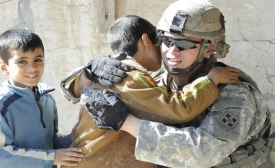middle east
Deputy Foreign Minister Danny Ayalon is the host in a new public diplomacy video on YouTube that explains the main reason for the conflict between Israel and the Palestinian Authority is not Israel's presence in Judea and Samaria, but successive Arab leaders' resistance to Jewish sovereignty.
The video was released as many analysts believe the terror network is struggling to cope with the loss of a string of leaders and has found its jihadist message undermined by popular protests against authoritarian regimes which have swept the Middle East.
Pakistan's newest TV game show, Alif, Laam, Meem, the Islamic version of Who Wants To Be a Millionaire...has become one of Pakistan's most popular shows. The show's emergence, and its burgeoning popularity, mirrors the broader direction of Pakistan...where religion is increasingly dominating all areas of life. Geo TV says the show's aim is to "impart knowledge of religion in its entirety".
And we need effective international partners in government and civil society who can extend this effort to all the places where terrorists operate. To achieve these ends requires smart power, a strategy that integrates all our foreign policy tools...
On the tenth anniversary of 9/11, Arabs opinion is, in my view, unduly harsh on a well-intentioned president. After all, the president is fulfilling his commitment to withdraw from Iraq and Afghanistan, and is certainly not meddling in the Middle East to prop up unpopular dictators...
Since 9/11, American views of Islam have grown more negative. However, views of Arab and Muslim people are moderately warm, and majorities continue to feel that the attacks of 9/11 do not represent mainstream thinking within Islam...
Although many non-Arab countries have developed elaborate public diplomacy programs directed toward the Arab world, most Arab governments have shown little interest in reciprocating this approach. Arab states engage in far too little outreach, even to other Arabs close to home.

The USC Center on Public Diplomacy hosted a panel discussion looking at U.S. public diplomacy in the Arab world ten years after the 9/11 attacks.
Read the event synopsis below.
Setting the framework for the event, panelists were asked to consider the question that U.S. policymakers have grappled with, “Why do they hate us?” and then with the broader issues of the tone and substance of American public diplomacy.







